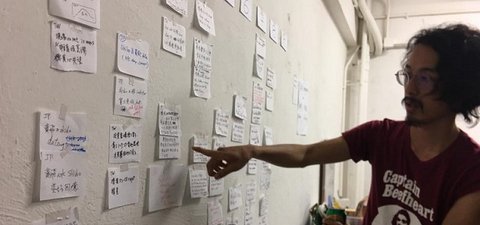After graduating from University, he traveled overseas a lot as a travel agency employee, but quit his job in 2011 to be a filmmaker. He studied film production in Tokyo. "I'm ten, then I'll catch eleven." is his debut feature. The film was nominated for the new director award of Directors Guild of Japan in 2014.
The Girl Who Never Knew War is his latest production which is screened at the short film section of the 30th Film Festival for Children and Youth. In an interview with the 30th Film Festival for Children and Youth, Jimbo said the poetic Iranian cinema affected him a lot and changed his way of looking at the world.
Please share the story behind your work. How is a child the focus of your work?
I went to the lantern floating ceremony, on August 6th 2008, which is a part of the Peace Memorial Ceremony in Hiroshima. I have no experience with war, but being among these beautiful lanterns in a melancholic atmosphere made me suddenly realize the reality that the war indeed happened.
In this story, a 6 years-old little girl, who doesn’t yet possess the concept of life and death, goes to the ceremony. I wanted to portray how she feels the wonder of life, of how she came into this world.
I wanted to show how great it is that we’re living everyday life and reflect on the fundamental question of what life means without directly referring to the war 70 years since it ended in Japan.
(This film was shot in 2015, that was the 70th year anniversary of the end of the Second World War.)
Does organizing a festival only for children and youth promote children cinema?
I believe having a separate festival for children and youth can improve and promote children cinema. Until I shot my feature film, of which protagonist is 10 years-old boy, I didn't know that there is a genre 'children cinema'. After I knew it, I could notice there are many beautiful children films in the world.
The most meaningful point of having children and youth film festival is the audience can come and watch films together by family and share the experience of watching film. It'll be fantastic children watches beautiful film with the family and share ideas and experience together.
You mentioned that Iranian cinema is your field of interest. I like to hear your thoughts and opinions on Iranian cinema.
Iranian cinema affected me a lot and changed my way of looking at the world. The first Iranian film I saw was "The Day I Became Woman" by Marzieh Meshkini. I remember I was astonished by the poetic expression of the film. Still I find many Iranian films very poetic and beautiful.
How do you evaluate children film industry in Japan?
Children film industry in Japan is honestly not so a good situation. In many Japanese films, child cast is used for unbeautiful things, for example to express violence (domestic violence etc...) or protagonist's miserable childhood. Of course anger, sadness or unhappiness can be very important essences for the film. However there are quite a few Japanese films which simply focus on beautiful sense of wonder of children.
As a film maker, I believe I have to make people realize how important the film is to appreciate the joy of life.


Your Comment